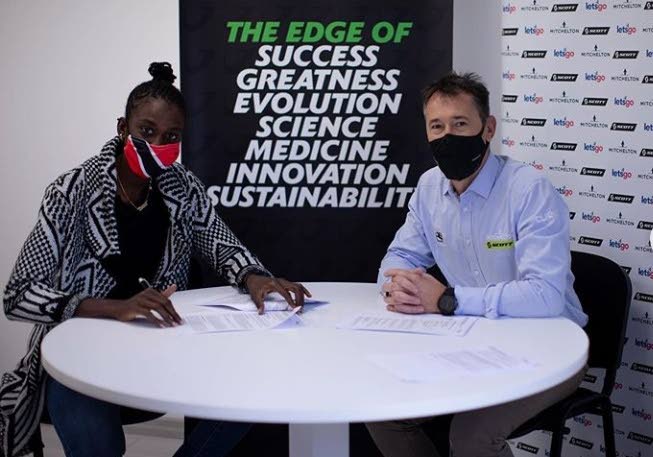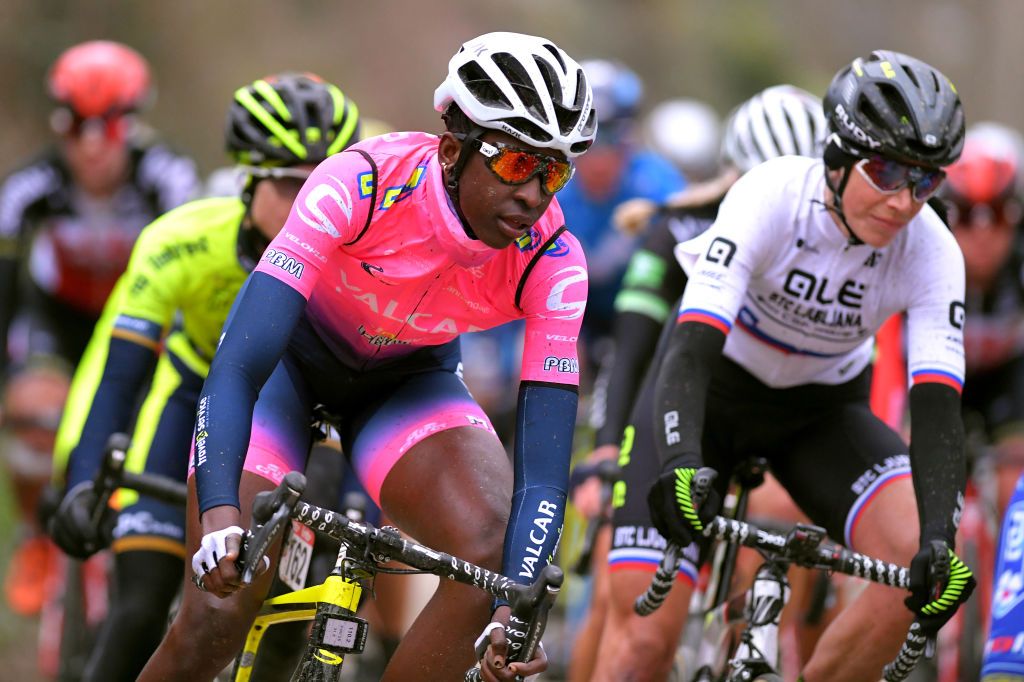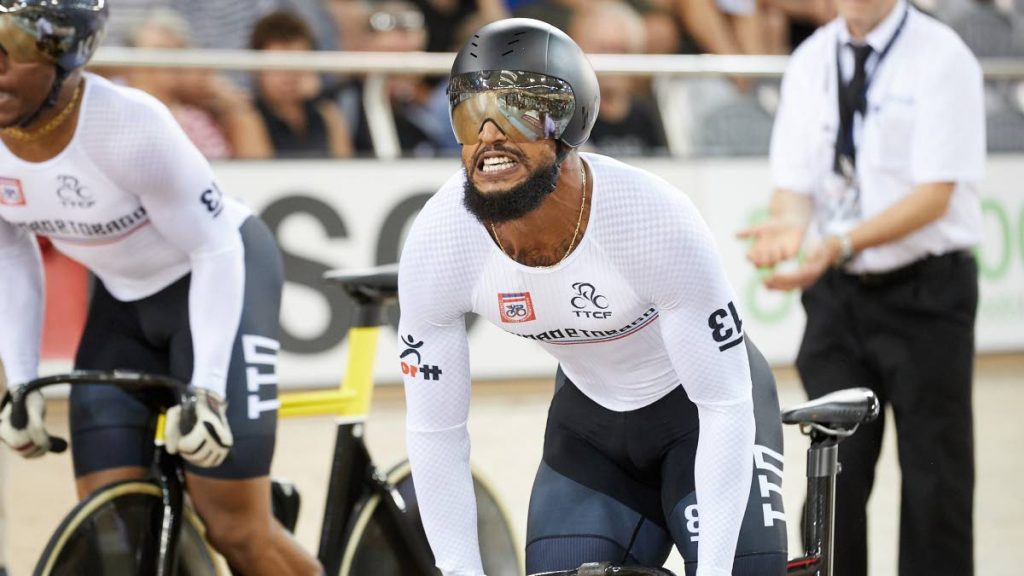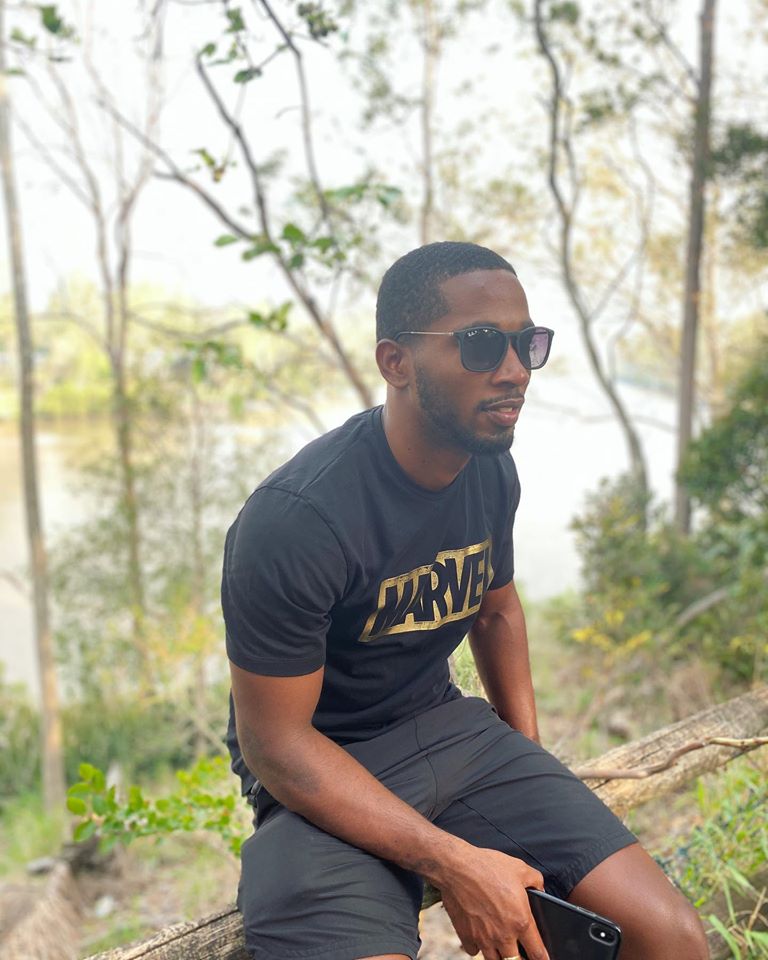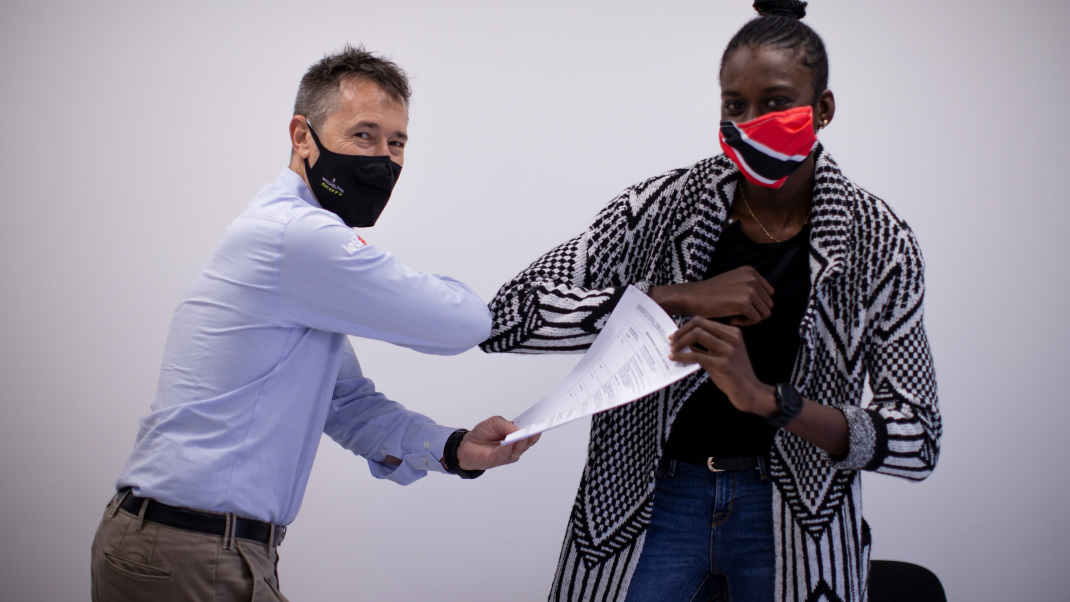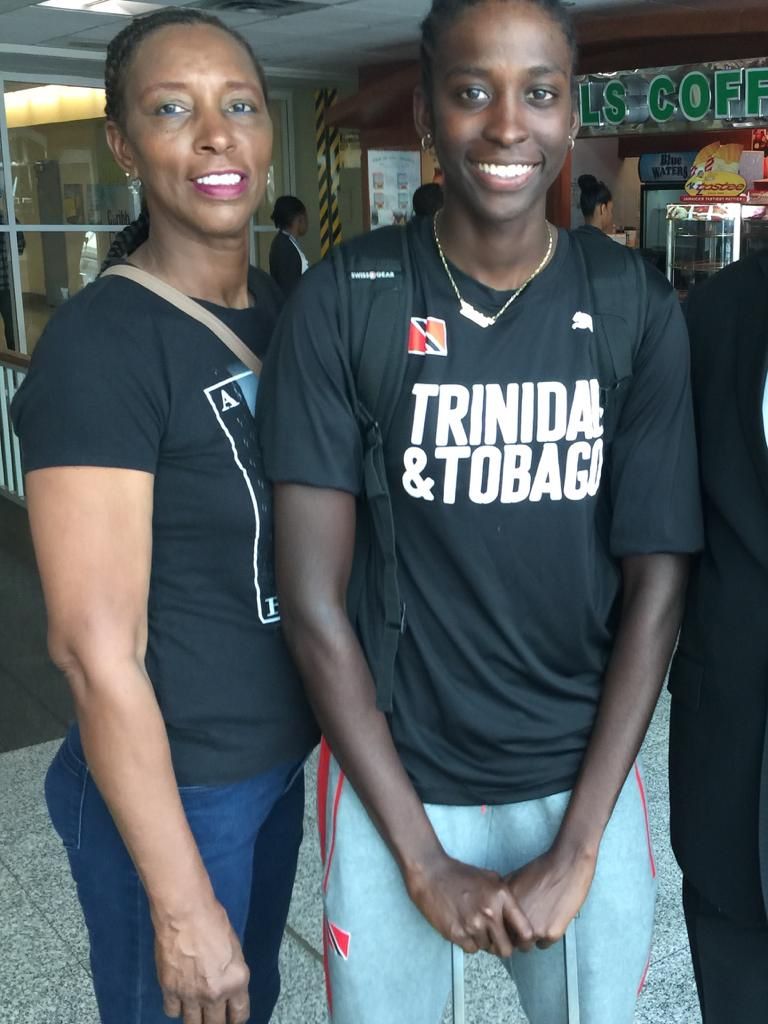'I'm humbled and grounded because I know what it took to get here – and it was not an easy road'
Hailing from Trinidad and Tobago, Teniel Campbell (Valcar-Travel&Service) is one of the fastest up-and-coming sprinters and time triallists in women's professional cycling. Her powerful 6'1" frame pushes over 1,200 maximum watts, and she is skilled and fearless, and possesses endless determination. These are the athletic attributes that will undoubtedly help her reach her dreams of winning a major one-day race, a world title, break world records, and win a gold medal at the Olympic Games.
In a phone interview with Cyclingnews, Campbell discusses competing in the sport's highest ranks and details her journey, which hasn't been easy, from the Caribbean to Europe, highlighting the obstacles and the opportunities she has experienced as one of few Black athletes in professional road cycling.
"To this day, I don't know how I am surviving life in Europe," Campbell says, thinking back to when she first arrived at the World Cycling Centre in Aigle, Switzerland, in 2018. Through her national federation, the sport governing body's president, David Lappartient, offered her a chance to live and train full-time on a fully paid scholarship at its headquarters.
"The first day I arrived in Switzerland, it was a transition from 25°C in the Caribbean down to -14°C. I was thinking to myself, 'What the hell is this?' I still remember that my chain busted within one week while out on a ride, and I walked home in the snow. I was freezing. I was shy in the beginning, and I never asked for help, and I didn't talk to anyone."
The World Cycling Centre provides support for young athletes that have been spotted by their cycling federations, especially developing nations, for having an aptitude for high-level training. The programme provides athletes with a full range of equipment, lodging, meals, coaching and an opportunity to compete in top-level races.
"The UCI is providing fantastic opportunities for developing nations," Campbell says. "They provide you with everything you need to advance in the sport. The only thing I had to do in Switzerland is wake up, train and sleep. You just have to go and smash it."
The World Cycling Centre (WCC) initially formed a club but upgraded to a Continental licence last year and is largely used as a launching pad into the professional ranks. Near the end of her first year in the programme, Campbell was offered a contract as a trainee to race for Cogeas-Mettler Pro Cycling. She then spent one more year at the centre and experienced one of the best seasons of her career in 2019. She won the overall title at the Tour de Belle Isle en Terra and fifth at the Nokere Koerse. She also won the under-23 time trial at the Pan American Championships and later that summer secured double silver medals in the time trial and road race at the Pan American Games.
Those performances put her on the radar of 12 women's teams. After negotiating multiple offers, she signed her first full-time contract with Valcar-Travel&Service for the 2020 season – officially graduating from the World Cycling Centre.
"I don't think I would be in the position I'm in now without having the opportunity to go to the WCC," Campbell says. "It gave me the chance to develop as a rider. The main focus was developing, growing, and the opportunity to do the big races and judge yourself against the riders you see on TV.
"I respect [the WCC] and all the opportunities that they gave me. I had leadership roles, domestique roles, and teammates that kept pushing me to improve. Our goal was to graduate from the programme and get contracts. It was a cool experience for all of us."
Campbell, now 22, grew up in Hardbargain, located on the south side of Trinidad. She learned how to race bikes at a local club and from hanging around with the boys. She says her country offers little in terms of cycling infrastructure, and few families place their children in the sport because it's too expensive.
"We have the talent but not the structure or investment like the other bigger nations in Europe. You wouldn't find parents capable of putting their kids in this sport; they would be quicker to put them in track and field or football. It's less stress on the pockets," Campbell says.
"I can personally tell you that it wasn't my family alone covering the equipment costs. I was really blessed and probably chosen to live this type of lifestyle. A lot of people helped me and believed in my potential. That is why I am so humbled and grounded because I know what it took to get here – and it was not an easy road.
"This is why I need to give back, and my way of giving back is to help the sport grow in my country. I can see these kids have talent. When they're juniors, you see it, but when they transition to elite, it sucks because they get broken and drop out. Talking about it makes me emotional.
"You could say that within Europe there's a bigger investment in the sport. They have the programmes, the money to finance development programmes, scout talent and they have structure, organisation and money."
Campbell attributes these factors to the reason professional cycling has such little diversity. In the European professional ranks, she says that she is one of two Black female cyclists, alongside cyclo-cross world champion Ceylin Carmen del Alvarado – a Dominican-born Dutch pro cyclist.
"That kind of sucks, but those two [Sierra and Alvarado] are both really strong," she says.
Systemic racism is a problem in cycling's highest echelons and black athletes have come forward to describe their experiences with racism in the sport, including French track sprinter and Olympic medallist Grégory Baugé.
The UCI has reiterated its commitment to diversity through its own World Cycling Centre programme and has pointed to several strategies it has taken in recent years to address racism. However, the sport governing body is also part of the problem and has been criticised for not stepping in to sanction or punish those who have violated its own code of ethics, for example, when Kévin Reza was racially abused by Michael Albasini in 2014 and again by Gianni Moscon in 2017, or when Natnael Berhane was racially abused by Branislau Samoilau in 2015 - the UCI chose not to issue punishments.
Campbell says that she hasn't experienced racial abuse during her two seasons competing in Europe. However, an encounter with two female cyclists while racing the Ladies Tour of Norway caused her to reflect on how challenging it is to break through racial prejudices and discrimination within a historically mostly white sport.
"The only time I was a bit shocked was the first time I did the race in Norway," Campbell recalls. "We were dropped, and I remember two girls turned around and saw me and said, 'Who is this?' I thought, 'Oh gosh.' After that race, I wrote to my coach and said I needed to train harder. It didn't sit right with me that I was getting dropped so easily, and I was a complete mess. I went home, did my homework, and came back with the motivation to make a name for myself on the European circuit and to be respected.
"As the wins come and people start to know you as a rider and to pay attention to you, that builds respect. You can see and feel that in the peloton. When they know you, and they know who you are, they respect you as a rider and a person.
"There are literally no athletes of colour in the peloton. You can distinguish me from the colour of my skin and my height. I didn't want to be known as that person. I want people to see me for the talent I have, not because of the colour of my skin or because I'm so completely different from everyone else. No, I don't want that. Me – I'm human. I have the talent, and that is what you must know me, see me and respect me for: my talent."
Campbell says the first two seasons were challenging in terms of gaining fitness, experience in the peloton, and fitting in with her peers within the sport. She says in the face of obstacles, she never once considered going back to Trinidad and Tobago. She says she gradually became more social at the World Cycling Centre and developed friendships among the sport. She's become more well-known on the pro racing circuit and has stood up to those trying to make her feel different.
"I have never, in the back of my head, seen colour," Campbell says. "I don't judge anyone. I come from a multi-ethnical country, and I grew up, basically, among all the races. I was raised right, and I know how to treat people. If you're nice to me, I'm nice to you. If you respect me, I respect you – this is how it should be. You shouldn't judge someone based on how they look. I think if you're just yourself, people will like you and accept you for who you are."
Campbell believes that the World Cycling Centre programme is helping to build diversity within professional cycling. With more time, investment, and opportunities, and more dedicated programmes like it, she's confident that the sport will become a more diverse representation of athletes at its highest level.
"It's the best way to diversify [pro cycling] and help people see different talents and to showcase that it's not about colour," Campbell says. "It's about determination, grit and the perseverance to achieve. We don't have the investment and the type of support in the Caribbean that the European nations get. In the coming years, that can all change. I don't see people for colour. I see everyone for being human."
Most of all, she wants to build opportunities for young cyclists in the Caribbean.
"Everyone wants to be a world champion, Olympic champion, and win the big Monuments, but apart from all of these things, my major goal is to help develop the sport within my country, the Caribbean region and beyond. I have a series of ongoing ideas, but nothing works if I don't work, so I must continue to stay on top of my game, working and training hard.
"I need to use the resources that I have to aid in the development back home so that they can have something to work with to help create a path for more Caribbean riders. We have a lot of talent in the Caribbean, and in Trinidad and Tobago, but we need exposure, investment, and the belief and confidence that we can be competitive in Europe."
In the short-term, Campbell's living in Italy and preparing to begin a revised Women's WorldTour calendar with her new team Valcar-Travel&Service. It's a country and a team that she says reminds her of home because of its relaxed culture and atmosphere.
"We're not so serious," Campbell says. "We're always laughing, but on race day, it's a full focus. I like the atmosphere because it reminds me of home and my friends, and our local club. It was a green light for me [to sign with Valcar] with less pressure in my first year with a top-end team. I didn't want to have leadership pressure.
"All of the riders have been on the team for more than five years: Elisa [Balsamo], Marta [Cavalli], Ciara [Consonni] – they progressively got stronger together. It's a young team, and we are all on the same level. It was a solid fit for me."
Asked what she missed most about her life in the Caribbean, Campbell says, "The food. My family can cook so good; I can't cook for anything; I could do with some barbeque and homemade roti. Curry is life. I searched for roti here, but the closest place I could go to get it was in London.
"In Italy, I eat lots of pasta, rice, pizza, and gelato. I'd be lying if I said I don't eat the bad foods. Italian food is very good, though, but if you don't have some self-control, you can overdo it."
Before lockdown in Italy, Campbell secured her new team a podium finish at the Vuelta CV Feminas and fifth place at the Omloop van het Hageland. She's looking forward to racing again with the new late-season calendar that will see 15 top-tier events and many of the one-day races that she hopes her team will perform well at.
"I see it, and I imagine winning," she says. "I can see the Valcar train coming. I see it in my head. I like the fighting in sprints. It's nerve-wracking and dangerous, but it's important not to think about that at those moments. The moment you think about that is the moment you mess up. You want to be aggressive, but only enough to be respected and execute a victory.
"I sprinted with the boys at home, and my speed was always there. I have a lot to learn, coming down to a sprint. It takes a team to carry you to the finish and good positioning to save energy. Knowing how to fight for the position is important. I would sit back and watch these aspects happening in a race at home, and then I try it myself."
At the top of her list is to win the world title in the time trial at the UCI Road World Championships in Aigle-Martigny, Switzerland, in September, but she is under no illusion about how hard that goal will be to attain facing the likes of former double world champion Annemiek van Vleuten (Netherlands) and reigning world champion Chloe Dygert (USA).
"Everything started for me in Switzerland, and to accomplish one of my goals in a country that provided me with a pathway into professional sports would be the cherry on the cake, and an amazing story," she says. "I know it won't be easy. I'm not that cocky to think I'd just smash it and take the rainbow jersey from Chloe Dygert. I know everyone is going to come for that jersey on a flat and windy circuit."
Campbell envisions a long career in professional cycling. She compares herself to that of Jamaican sprint legend Usain Bolt for his accomplishments and charismatic personality.
"I want to achieve the unthinkable," Campbell says. "When I retire, I want people to remember me in the same way they remember Usain Bolt – a legend. I haven't met him, but I always imagine myself being the female Usain Bolt of the Caribbean. We are both laidback, fun and chill, but when it comes to the competition? It's go-time, it's showtime."
Campbell's strength and unstoppable determination will undoubtedly help her reach many of her endeavours in the sport. However, aside from personal ambition, she races with the knowledge that an entire region of the world, the Caribbean, is watching her pave the way for young cyclists to break into professional cycling.
"I have all these crazy dreams, thoughts and ideas, and I just want to make them happen," Campbell says. "I don't want just to say it, I want to do it. I don't want to give anyone false hope; I just want to show the others that it can be done. Once you have that mental capacity and determination, you can accomplish anything."
Source

